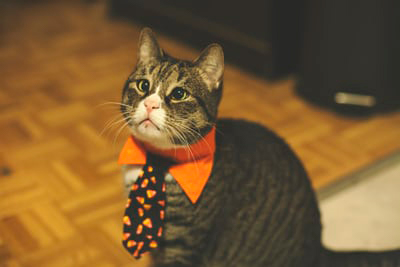Media – Unsightly Cat Chin
Acne isn’t a Heart Breaker
Question:
I am wondering how cats develop feline acne.
Dr. Nichol:
We used to think that these unsightly carbuncles and blackheads on cats’ chins were infections and that some of these pets, despite their excellent upbringings, had questionable personal hygiene. With further research it turns out that feline acne is related to a dysfunction of the hair follicles. It does not reflect a flawed character.
There can be comedones (black heads), papules (little red bumps), crusts, scabs, pustules (white heads), hair loss, and in severe cases, pain. Some kitties face only one bout of chin acne, others endure recurrent outbreaks. The outer “keratinized” skin layers, oil glands, and possibly the local immune system are involved. It isn’t pretty.
This a complex skin disorder that is not yet fully understood. Some cats react to their food, their stainless steel bowls, or to other allergic causes. Mange, yeast, ringworm, and bacterial infections can be secondary invaders. If you don’t get this under control soon your cat may become a long-haul mask wearer.
Your cat’s doctor can start with a skin scraping and possibly a fungal culture. Her chin (your cat’s, not the veterinarian’s) can be scrubbed with benzoyl peroxide shampoo followed by at-home mupirocin ointment. A spot-on medication called Allerderm will help replenish skin oils.
A resistant infection called MRSP can make these cases challenging. According to veterinary skin specialist Dr. Rebecca Mount of Dermatology for Animals these cats also need a bacterial culture. A carefully chosen oral antibiotic may be necessary. Avoid hydrogen peroxide; it’s uncomfortable and actually does more harm than good.
Forget human acne remedies. You may already know this, but cats are not little people in furry suits. If you squeeze the lesions the hair follicles can rupture requiring months for the body to resorb the skin fragments and broken hairs. Stridex pads and witch hazel can irritate a cat’s skin. There is no evidence supporting vitamin supplements.
Management isn’t difficult; most kitties tolerate the attention with good humor. Tony, the Nichol family cat, powered right through his one and only occurrence of chin zits. His twice daily treatments felt like just more chin rubbing.
Dr. Jeff Nichol is a residency-trained veterinary behaviorist. He provides consultations in-person and in groups by Zoom (505-792-5131). Each week he shares a blog and a Facebook Live video to help bring out the best in pets and their people. Sign up at no charge at drjeffnichol.com. Post pet behavioral or physical questions on facebook.com/drjeffnichol or by US Post to 4000 Montgomery Blvd. NE, Albuq, NM 87109.


